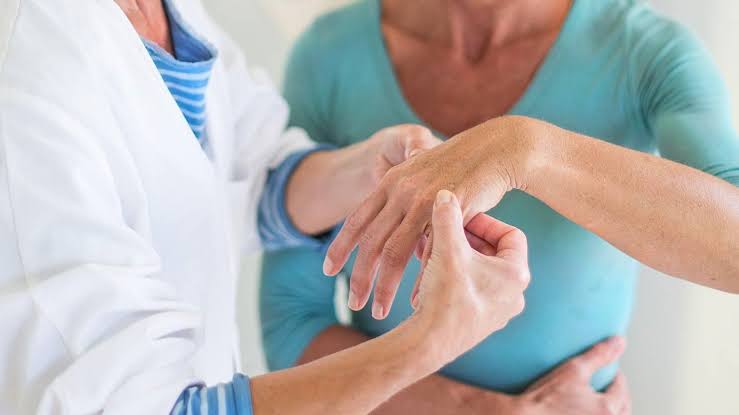A consultant rheumatologist, Dr Hakeem Olaosebikan, says early diagnosis and initiation of effective treatment have been shown to improve clinical outcomes for patients with Rheumatoid Arthritis (RA).
Olaosebikan who works at the Lagos State University Teaching Hospital (LASUTH), Ikeja, said this during a virtual rheumatology awareness media roundtable organised by Pfizer Biopharmaceutical on Thursday.
RA is a systemic autoimmune disease which is characterised by chronic inflammation of the joints.
Patients with RA present with pain, stiffness and warmth of the affected joints, and the disease may lead to disability or premature death, if not treated early and appropriately.
Olaosebikan said it had become imperative to raise awareness about rheumatology, as well as, enlighten the public about management of rheumatoid arthritis to prevent disease progression.
He noted that rheumatoid arthritis was the commonest autoimmune arthritis in Nigeria.
According to him, one or two patients are diagnosed weekly with the disease in most tertiary hospitals.
He noted that early diagnosis was critical to delaying disease progression and averting the development of irreversible joint damage and functional disability.
Olaosebikan said the disease poses physical, psychological, and economic burdens for affected patients, their families and the healthcare system.
“Adequate treatment is also important to try to prevent or lessen the severity of comorbidities, particularly cardiovascular disease, which is still a major cause of mortality in these patients.
“Apart from treating the rheumatoid disease, the patient should ideally be treated by a multidisciplinary team to address many other associations of this disease.
“They range from psychological help with anxiety and depression to guidance with physical therapy by physiotherapists or biokineticists and help with activities of daily living by occupational therapists,” he said.
Olaosebikan, however, noted that most patients present late for treatment due to a lack of access to rheumatology care and rheumatology experts who were few in the country.
The rheumatologist added that laboratory diagnostic processes were also a challenge to early diagnosis of the disease, as most of the tests were done outside the country.
He called for deepening of diagnostic testing capacity and broadening health insurance.
Olaosebikan noted that Biologics which constitute the main treatment for the disease was unaffordable for most people without insurance.
He appealed for increased government focus on the disease and the need to evolve and pass patient friendly legislatures.
He advised people to reduce calorie and salt intake, maintain healthy weight, avoid smoking and ensure regular exercise to strengthen joint mobility.
Also, Dr Uyiekpan Ima-Edomwonyi, a rheumatologist at the Lagos University Teaching Hospital (LUTH), said that emerging data had shown that the burden of rheumatoid arthritis would increase in most developing countries.
Ima-Edomwonyi said that factors that would drive the disease burden includes lifestyle, weight, smoking and alcohol consumption which predisposed to musculoskeletal disorders.
“An increase in rheumatoid arthritis occurrence could stress medical services that are already struggling with a high burden of acute infectious illness to an extent that they may be unable to cope with the fast-changing patterns of disease distribution seen in Africa today,” he said.
Olaosebikan advised healthcare professionals and rheumatologists to identify rheumatoid arthritis early and commence appropriate therapy quickly.
Similarly, Dr Kodjo Soroh, Country Medical Director, Pfizer East and West Africa, said rheumatoid arthritis remains one of the most common rheumatic and musculoskeletal disease (RMDs) in the region.
Soroh noted that there was hope, as Pfizer aims to continue raising awareness around the treatments available for the disease.
“We want to work closely with the healthcare community to ensure early diagnosis, increased patient access and medication adherence.
“There is Project Afya, a patient assistance programme, aimed at improving access to life-saving medications and boosting cancer care and autoimmune disease management.
“The platform, in partnership with IQVIA, is helping to reduce therapy costs for eligible patients as rheumatologists identify patients for enrolment into the programme,” he said.
